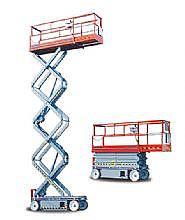NEW inspection requirements for elevating work platforms (EWP) are likely to have a significant impact on industries employing such equipment. Although these inspections represent only clarification and enforcement of existing requirements, they will undoubtedly ‘clean up’ areas of EWP use. Widely used in construction and maintenance for working at height, most end users have assumed ‘scissorlifts’ and ‘cherrypickers’ are already subject to exacting maintenance standards similar to those for cranes. However, EWPs slipped through the cracks during crane regulation and the laissez-faire approach to safety of the 1990s. Together with loosely worded inspection requirements in the Approved Code of Practice for Power-Operated Elevating Work Platforms, it allowed a flood of non-compliant ‘used imports’ into operation in New Zealand in recent years. The poor condition of such machines, and the absence of safety features coupled with low maintenance standards has led to a number of accidents and mechanical failures. Together with untrained EWP operators, uncertified equipment has come to represent a high safety risk in an increasingly risk averse environment. Changes to health and safety legislation, adoption of quality systems and refinement of insurance and contractual obligations have led to an increased focus on assurance of compliance. The consequences of discovering non-compliance only after an accident have become too great to ignore. Code of Practice The Code of Practice has existed since 1995 and industry has been generally happy with its provisions for maintenance and inspection. These include periodic major inspections to AS2550.10 for all machines and before operation for used imports. However, the Code’s lack of definition of ‘competent persons’ acting as EWP inspectors has led to widespread use of defective or bogus certification, both at time of sale and on an ongoing basis. In 2004 industry pressure led the then OSH to convene a group to address this issue, leading to the formation of a new ‘EWP Panel’ under the auspices of the Certification Board for Inspection Personnel (CBIP is the body that has traditionally certified crane, lift, boiler and welding inspectors). In 2005 the EWP Panel produced the first ‘Standard of Proficiency’ for EWP inspectors, and this requirement is being phased in during 2006 as inspectors sit the necessary examinations. While the status of codes of practice under our health and safety legislation means that such certification cannot be treated as mandatory, the Department of Labour’s (DoL) position is that, while it will recognize a qualified inspector’s certificate ‘as of right’, there will be a heavy onus on any other certification to prove its equivalence. The industry is co-operating with SiteSafe, unions, DoL and insurers to ensure that the scheme becomes a de facto requirement. Taken together with the recently introduced EWP operator training program, 2006 should leave end users of this equipment with a far greater sense of safety and security. And it should relieve the headaches of many safety officers. For more information go to www.ewpa.org.nz or www.dol.govt.nz/News/Media/2005/elevatingplatforms.asp Article supplied by Bryan Nunweek of Central Hire Ltd, secretary of the Elevating Work Platform Association of New Zealand.
Elevating work platform safety
General
Monday, 13 February 2006






